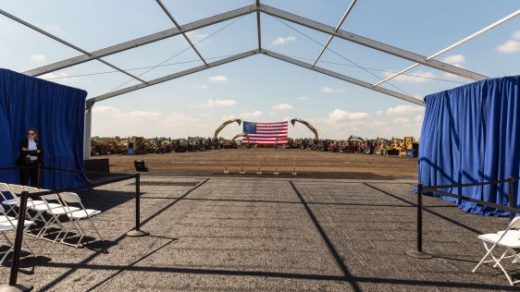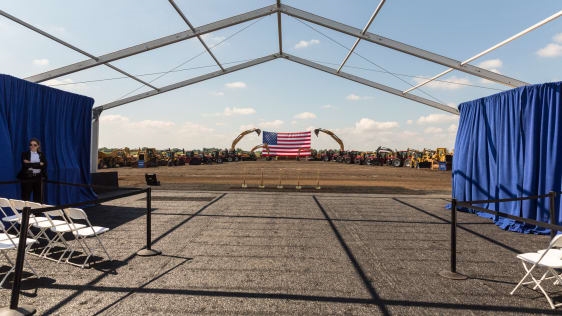Foxconn’s Wisconsin factory is shrouded in questionable dealings
Maybe you remember the big show at the White House after Foxconn agreed to build a new manufacturing plant in Mt. Pleasant, Wisconsin. Trump was there to tout the deal as a victory in his “America First” crusade. Wisconsin Governor Scott Walker was there trying to win back some of his state’s respect after his 2016 presidential bid took a nose-dive.
And Foxconn founder Terry Gou was there to play on these desires, hoping to get a new American factory on the cheap. The state of Wisconsin agreed to hand over a $4.1 billion subsidy to Foxconn, which will cost Wisconsinites more than a million dollars per job created. And a nonpartisan study shows the state won’t see a return on this investment until 2042.
Now two news stories are emerging that show how one of Trump’s biggest “America First” triumphs is mostly benefitting Foxconn. Just one day before the country votes in numerous Congressional elections, a New Yorker piece shed some light on the shady tactics used by the Mt. Pleasant’s Village Board of Trustees to get the needed land. Here’s the nut:
“To make space for Foxconn’s development, which will also necessitate many miles of new roads, the Village Board has been buying properties, sometimes using the threat of eminent domain to force reluctant homeowners to sell at a price determined by the village. Several weeks before the groundbreaking, the seven-member board went further. By a 6–1 vote, the board designated the entire twenty-eight-hundred-acre area “blighted,” which will allow Mt. Pleasant to issue bonds that are exempt from both federal and state taxes, and may also grant the village a more expansive use of eminent domain to seize the property of the few remaining holdouts, a small if highly visible group, whose property-rights fight embodies a wider sense of disenchantment with the Foxconn deal.”
Part of Foxconn’s agreement with Wisconsin is that it will invest $100 million to build a new research facility at the University of Wisconsin’s engineering school. Foxconn Institute for Research in Science and Technology (FIRST), as it will be called, will comprise a group of Foxconn buildings at the company’s industrial park near Madison, as well as some “Foxconn-sponsored” buildings on the UW engineering campus. Today, The Verge published a story about UW engineering students’ anxiety over the less-than-transparent way the university and the corporate sponsor are planning the facilities:
. . . on campus, the partnership has proven controversial. Last week, the dean of the College of Engineering, Ian Robertson, held a town hall and fielded pointed questions from graduate students who are concerned about the partnership’s implications for intellectual property and academic freedom as well as the opacity of the partnership overall. “We haven’t been told anything,” says graduate student Sonali Gupta. “We went to the town hall to get some answers and came away more confused.”
The main issue is the intellectual property ownership of engineers working in the new facility. Normally, student researchers would retain control of the IP they generate, and the right to publish it. But when a sponsor is involved, the rules change. The university has said intellectual property generated from work done in the new facility will be managed under one of three IP-sharing agreements with Foxconn, the sponsor. In only one of them does the university retain full control of the IP.
The main reason the university needed Foxconn’s involvement is because the state of Wisconsin, under Walker himself, cut its funding by $362 million between 2012 and 2017. In the absence of funds, universities must, and often do, turn to corporate sponsors, which affects IP ownership. In a sense, the vital research that happens within the nation’s universities is being privatized.
(12)



